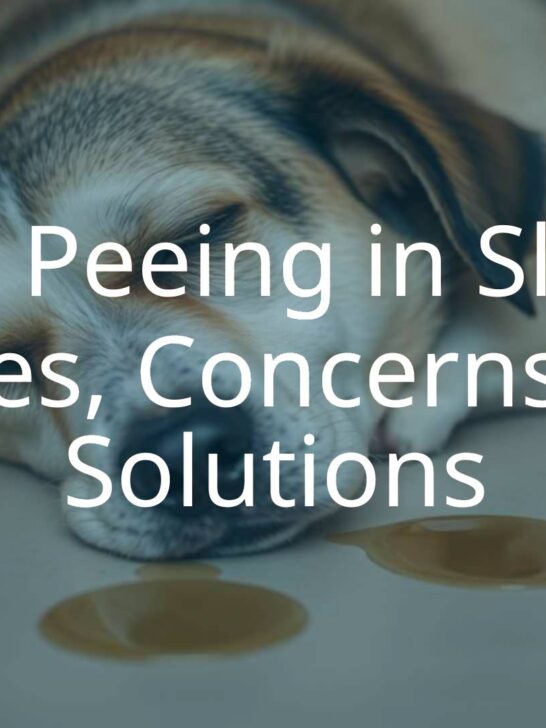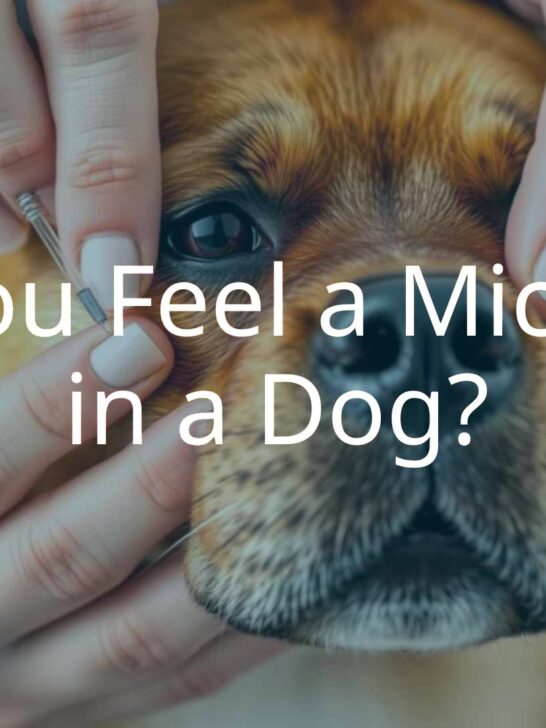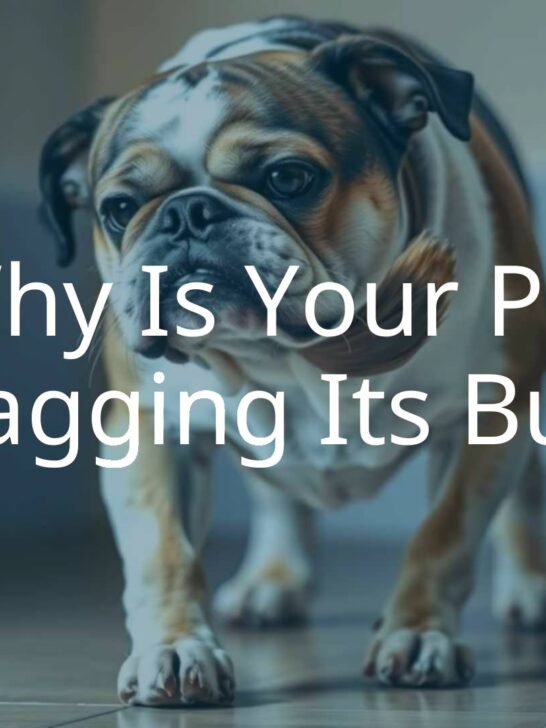Dog Peeing in Sleep: What It Means and What to Do
Finding out your dog has peed while sleeping can be confusing and upsetting for any pet owner. It’s not just a matter of cleaning up; it can mean there’s a problem with your dog’s health. While one accident might not be too concerning, if it keeps happening, it’s time to take a closer look. When a dog pees while sleeping, it’s usually called urinary incontinence. In this case, your dog loses control of their bladder while resting or in deep sleep-they don&t know it’s happening and aren’t doing it on purpose. To help your dog and keep your home comfortable, it’s helpful to know what might cause this, how to notice the signs, and what treatments are available.
If you want to help your dog stop peeing in their sleep, it’s important to know that this is often a medical issue rather than a behavior problem. As pet owners, it’s up to us to care for our dogs and address any health concerns they might have. This article will explain why a dog might pee while sleeping, what to look out for, when to call the vet, and what you can do about it to help your dog live comfortably.

Is It Normal for a Dog to Pee in Their Sleep?
The simple answer is no-it’s not normal for a healthy adult dog. House-trained dogs usually have good bladder control and will wake up if they need to go outside. If your dog keeps wetting their bed or leaves wet spots where they sleep without waking up, it’s usually a sign that something is wrong. This sort of accident is called urinary incontinence-it happens by accident and without the dog knowing, which is different from a dog purposely peeing inside.
One incident might not mean much, but if it keeps happening, your dog’s bladder control is likely weakened. When a dog is asleep, their muscles relax, but healthy dogs still have enough muscle tone to keep from leaking urine until they wake up. If your dog is peeing during sleep, those muscles may not be working correctly. Remember, this isn’t about bad behavior or laziness-it’s involuntary and deserves attention from a vet.
Standard Dog Urine Habits and Sleep Patterns
A typical adult dog urinates about three to five times per day, affected by how much water they drink, what they eat, and how active they are. Most dogs can hold their bladder for many hours, even overnight. The urinary muscles relax during sleep but should still be able to keep urine in until the dog wakes up. If a dog pees while sleeping, it means that this ability is not working as it should. Owners usually notice wet spots where their dog was lying down, and the dog isn’t aware it happened. This is one of the key signs of real urinary incontinence and should be checked by a vet.
Puppies vs. Adult Dogs: What’s Typical?
It’s common for young puppies, especially under five months old, to have nighttime accidents-they simply don’t have strong bladder control yet. Checking for accidents in very young puppies is normal and part of training, and they’ll grow out of it as they get older. Once puppies are about five months old, they usually gain better control and can stay dry through the night. However, if a dog who used to stay dry at night starts peeing in their sleep, and they’re not a young puppy, it often means a health issue or something else is wrong. Though more common in older dogs, incontinence can happen to any dog, so young dogs with this problem should see a vet too.
Why Is My Dog Peeing in Their Sleep?
There are several possible reasons a dog might pee while sleeping, and some are more serious than others. Figuring out the exact cause will help your vet choose the right treatment. Here are some common reasons:
| Cause | Description | Common in |
|---|---|---|
| Urinary Incontinence | Loss of bladder control, often from weak sphincter muscles. Most cases of sleep urination are this. | Older, spayed females |
| Urinary Tract Infection (UTI) | Bacteria in the urinary tract causes irritation, frequent urination, possible accidents while sleeping. | Any dog |
| Hormone Imbalance | Lack of estrogen or testosterone weakens bladder muscles, often seen after spaying/neutering. | Female dogs after spaying |
| Age-Related Muscle Weakness | Older dogs’ muscles get weaker, including those needed for bladder control. | Senior dogs |
| Congenital Defects | Birth defects or anatomical problems can cause lifelong leakage. | Puppies, younger dogs |
| Neurological or Spinal Issues | Nerve damage or spine conditions can mess up bladder signals to the brain. | Any age, but more common with injury or age |
| After Anesthesia or Surgery | Temporary muscle relaxation after procedures can cause short-term leaking. | Post-surgery |
| Other Medical Conditions | Diseases like diabetes, kidney problems, Cushing’s, stones, or tumors can cause incontinence. | Any dog, often middle-aged or older |
| Cognitive Decline (Doggy Dementia) | Older dogs may forget trained behaviors and not sense a full bladder. | Senior dogs |
| Stress or Anxiety | Rarely, stress or overexcitement can trigger accidents. | Younger or anxious dogs |
| Lack of House Training | Puppies or new rescues may not have learned to hold their bladder overnight. | Puppies, new dogs |
How Can I Tell if My Dog Has Urinary Incontinence?
It’s important to tell the difference between medical incontinence and other types of indoor peeing. Here are key signs of urinary incontinence:
- Wet patches where your dog was sleeping or lying down, often with the dog unaware it happened
- Your dog’s hind legs, belly, or genitals might be damp or smell of urine
- Increased licking around the private areas
- Red or irritated skin around the back legs or genitals
- A lasting urine smell on your dog or their bedding
If you see these symptoms, especially if your dog doesn’t seem to know they’ve urinated, it’s likely incontinence. Other problems (like pain when peeing, blood in the urine, or changes in thirst) should also be reported to your vet right away.
When Are Night Accidents a Concern?
Nighttime accidents, especially repeated ones, are usually the first sign there’s an issue. Even a small wet spot on the bed or just on your dog’s fur is a red flag if it happens often. Ignoring these signs can make things worse, as wet skin can quickly become sore and infected.
How to Tell Incontinence from Deliberate Marking
It’s important to know if your dog is having accidents because of medical reasons or marking territory. Marking usually happens when your dog is awake, alert, and assumes a specific posture. Incontinence happens when the dog is resting or sleeping, and your pet doesn’t even notice. Watch your dog’s behavior and timing of these accidents-your vet will want this information.
When Should I Call the Vet?
If your dog-especially one that has been house trained-starts peeing in their sleep, get in touch with your vet. Here are warning signs that mean you should call sooner:
- Accidents are happening again and again, even if it’s just a little urine
- It’s getting worse over time
- Your dog looks like they’re straining or in pain when peeing
- The urine is bloody, cloudy, or smells much worse than usual
- Your dog is drinking a lot more water or eating more/less than usual
- Lethargy or sudden changes in mood or energy
- Skin around the hind legs or belly is red, sore, or missing fur
- There is blood in your dog’s urine (call your vet immediately)
Even mild leakage should be checked. Leaving urinary issues untreated can cause infections or other serious problems. Getting help early can avoid complications and get your dog feeling better faster.
How Vets Figure Out Why Your Dog is Peeing in Sleep
Your vet will ask about your dog’s symptoms, then examine your dog. They might do:
- Ask about when and how often accidents happen and if anything else has changed
- Physical exam, checking for tenderness or obvious problems
- Urinalysis (test on a fresh urine sample, which helps find infections or other problems)
- Blood work to check for underlying diseases like diabetes or kidney trouble
- X-rays or ultrasound pictures to look for stones, tumors, or birth defects
- Exams for nerve function if spinal or brain problems are possible
- Special tests, like putting a camera in the bladder, in harder cases
With all this information, your vet will recommend the best treatment for your dog’s specific situation.
What Are the Treatment Options for Dog Peeing in Sleep?
The right treatment depends on the cause. Many dogs get better with medication, and a small number might need surgery. Here are the main types of treatment:
Medications
Medicine can help many dogs, especially females with hormone-related incontinence or weak bladder muscles. The main drugs are:
- Phenylpropanolamine (PPA, like Proin): Helps tighten bladder muscles. Shouldn’t be used in dogs with high blood pressure.
- Estrogen medications (like Incurin or DES): Especially for females with low estrogen after being spayed. Sometimes combined with PPA to improve results.
- Gonadotropin-releasing hormone (GnRH): Less common, used when other treatments don’t work.
- Imipramine: Sometimes used, especially if the dog also has anxiety.
For UTIs, antibiotics are usually very effective. Managing health problems like diabetes or Cushing’s disease also helps reduce urine leakage.
Hormone and Non-Hormonal Treatments
Hormone drugs are mostly for hormone-related cases (usually in females). Non-hormonal drugs like PPA strengthen the muscles directly. Your vet will decide which is best for your dog.
Surgery for Anatomical Problems
Dogs with birth defects or long-term incontinence that doesn’t improve with medication might need surgery. Repairs might include moving the structure of the bladder or urethra, or newer options like injecting collagen to help the bladder stay closed. Complex surgeries are usually done by specialists.
Outlook for Incontinent Dogs
Many dogs with incontinence improve with treatment, especially hormone-related or simple infection cases. Around 70% of dogs with incontinence get much better or have no symptoms once treated. Sometimes, dogs need medicine for life, but most can live very comfortably.
How Can I Help My Dog at Home?
You can do several simple things at home alongside veterinary care to make your dog more comfortable and keep your home cleaner:
- Give your dog more bathroom breaks-take them out more often and right before bedtime
- Keep water available at all times (don’t cut back unless your vet tells you to) since clean kidneys and a healthy bladder need good hydration
- Use dog diapers or waterproof bedding for dogs with frequent accidents; make sure bedding is washable and helps keep your dog dry
- Clean your dog’s fur and bedding regularly to prevent skin irritation and keep smells down
- Try to keep your dog’s routine steady and the household calm, as stress can make things worse
- Reassure and comfort your dog-never punish for something they can’t control
Can CBD or Natural Remedies Help?
Many owners are interested in natural treatments like CBD. However, there’s very little science right now to show that CBD or other herbal remedies fix the actual causes of incontinence. They’re mainly studied for things like helping with anxiety or pain. Some owners say CBD seems to help if their dog’s incontinence is worse with stress, but it won’t treat the medical reasons for incontinence.
If you want to try CBD or anything similar, talk to your vet first. They’ll make sure nothing in those supplements interacts with your dog’s prescription medicine or causes harm. Don’t rely on natural products alone and delay real treatment-addressing the underlying cause is most important.
Frequently Asked Questions about Dog Peeing in Sleep
Is Dog Incontinence Always Caused by Old Age?
No, incontinence isn’t just an old dog issue. While it’s more common in older dogs, it can affect puppies (from birth defects), young dogs (from infections or nerve problems), or spayed females (from hormone changes). Any dog peeing in their sleep should see a vet.
Do Puppies Outgrow Nighttime Pee Accidents?
Yes, most young puppies stop having nighttime accidents as they grow and become fully house-trained, generally by five months of age. If a trained adult or older puppy starts having accidents in their sleep, however, it’s not a normal part of puppyhood and should be checked by a vet.
Does Spaying or Neutering Cause Incontinence?
Spaying can increase the risk of incontinence in female dogs by removing estrogen, which helps keep bladder muscles strong. Up to 20% of spayed females, especially large breeds, might develop this kind of incontinence. Early-spayed dogs are even more at risk. Neutered males have a lower risk, but they can also be affected. Hormone-based medicines usually help a lot with these cases.
























